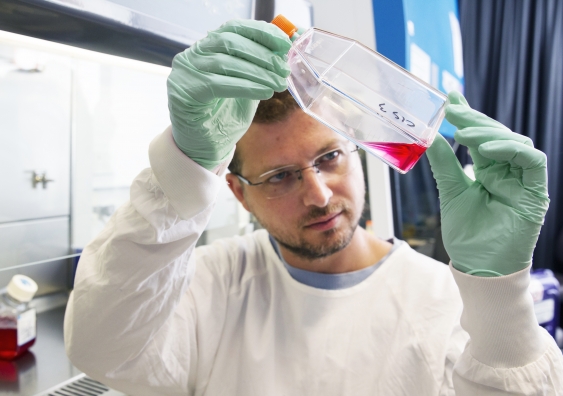UNSW researchers working on treatments for some of the most aggressive cancers including neuroblastoma, leukaemia, and pancreatic and breast tumours have received major backing in the latest round of funding from The Cancer Institute NSW.
More than $11.6 million was earmarked for research across the state. The announcement was made this week by Minister for Health and Medical Research Brad Hazzard.
UNSW-affiliated researchers across the Children’s Cancer Institute, South Western Sydney Clinical School, Prince of Wales Clinical School and the Garvan Institute of Medical Research were the recipients of four early career fellowships and three career development fellowships worth a combined $3.2 million.
Early Career Fellowships
UNSW Conjoint Lecturer Dr Pei Yan Liu, from the Children’s Cancer Institute, has been awarded $576,000 to research whether neuroblastoma can be eradicated by targeting a novel long non-protein-coding RNA (ribonucleic acid) she recently discovered. The RNA is found in large amounts in high-risk neuroblastoma. Dr Liu will test new combination therapies to target the RNA. The complex molecules found in cells encode and control the expression of genetic information.
Dr Ying Zu, from UNSW’s South Western Sydney Clinical School, has been awarded $572,000 to study how nanoplasmonic sensors can be used to diagnose non-invasive breast cancer. Nanoplasmonic sensors use nanoparticles and offer unique properties, including ultrahigh sensitivity.
UNSW Conjoint Associate Lecturer Dr Dan Carter, from the Children’s Cancer Institute, has been awarded $571,000. His research will be based on his discovery that a small group of genes controlling cell division are substantially increased in the cells that initiate tumours. He will investigate if increased levels of the genes are needed for neuroblastoma to begin and then test if drugs inhibiting the genes could be a new therapy for high risk subtypes of neuroblastoma.
Dr Dominik Beck, from UNSW’s Prince of Wales Clinical School, has been awarded $549,000 to research how long non-coding RNA expression improves the risk profiling and treatment outcomes for patients with Acute Myeloid Leukaemia. The disease has a five-year survival rate of 24%.
Career Development Fellowships
UNSW Conjoint Lecturer Dr David Gallego Ortega, based at the Garvan Institute, has been awarded $597,000. His research focuses on making immunotherapies an effective treatment for breast cancer.
Immunotherapies, which ‘re-educate’ the immune system to recognize and combat cancer cells, have achieved exceptional success against some types of cancers, particularly lung cancer and melanoma. In breast cancers, however, immunotherapy has been disappointing because in breast tumours the immune system’s function is ‘dialled down’ and immunotherapies can’t work effectively.
Dr Gallego-Ortega’s work will use state-of-the-art technology to investigate, at single-cell level, how this happens, and how to reverse it, so that the immune system can effectively target breast cancer cells.
UNSW Conjoint Senior Lecturer Dr Marina Pajic, based at the Garvan Institute, has been awarded $150,000 to explore how immune modulators can be combined with anti-invasive treatments for pancreatic cancer. Immune modulators are a relatively new category of medications used in the treatment of certain types of immunologic and inflammatory diseases.
UNSW Conjoint Lecturer Dr Orazio Vittorio, based at the Children’s Cancer Institute, has been awarded $150,000 to evaluate the potential of dextran-catechin as a future neuroblastoma treatment. The chemically-modified natural compound combines catachin, an antioxidant found in green tea with a sugar based compound, dextran. It targets copper metabolism, which plays a key role in the progression and aggressiveness of neuroblastoma and is an emerging target for anticancer drug design.


